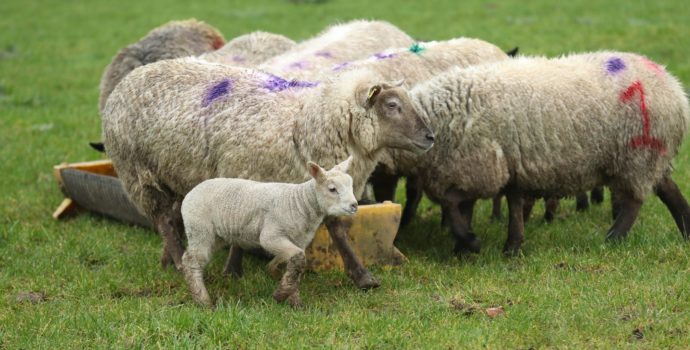48% of Farmers Have No Identified Successor – Land Mobility and Succession in Ireland Study Launched

Thursday, the 24th January 2013 – The findings of a study on ‘Land Mobility and Succession in Ireland’ have been launched today by Macra na Feirme National President, Alan Jagoe in Dublin. The study revealed that 48% of those surveyed did not have a farming successor identified with 40% stating that it was important the land remained farmed by the family. The research was commissioned by Macra na Feirme in partnership with the Irish Farmers Association, the Irish Farmer’s Journal and the Department of Agriculture, Food and the Marine.
The research was undertaken by Broadmore Research by way of a combination of a telephone survey (with a random sample of 421 IFA members aged over 50 years) and a series of focus groups involving IFA and Macra na Feirme members. The primary aim of this research was to determine the future plans (short and long term) relating to farming and land ownership for those who did not have an identified farming successor.
Alan Jagoe, Macra na Feirme National President, speaking about the findings said, “Access to land or “Land Mobility” has always been an issue for young farmers and the agricultural industry. CSO figures show that only 6.2% of farmers are under 35 and 26.3% over 65. That is a decline of 52.8% in numbers under 35 years from the 2000 to the 2010 census. These figures are in contrast to our agricultural colleges which are at full capacity with young farmers looking for a career as farmers. Macra na Feirme identified the issue of land mobility as a key factor to increase agricultural output whilst also getting more young farmers established.”
“The Land Mobility and Succession in Ireland study highlights a number of areas which need to be improved upon. Older farmers without an identified successor, which were 48% of those surveyed, must make better long-term plans for the future of their farm. From the study, we see that these farmers plan to reduce intensity or scale back their farming enterprises. We also see a level of mistrust and scepticism exists about long-term leasing which needs to be treated through better promotion and information. Older farmers need to be encouraged to make plans for retirement which will support their needs and make provisions for the younger generation of farmers to take a foothold in the industry. Only 5% of farmers without successors had received formal advice or information on succession – this figure must be improved upon to ensure that farmers are choosing the best option for their future. The Government must support the process of land mobility by retaining tax incentives to ensure that future generations of farmers have access to land.”
Mr. Jagoe announced details of work to be carried out following the study, “I am delighted to announce that, with the generous support of the FBD Trust, we will be appointing a Land Mobility Programme Manager who will progress the recommendations made in the study. This person will play a central role in the promotion of land mobility and the options available to farmers.”
Speaking at the launch of the Land Mobility and Succession in Ireland Research Report, IFA President, John Bryan, commended Macra na Feirme for taking the initiative in identifying the barriers that exist to land mobility and succession. He said IFA has been very supportive of the study as the Association recognises the importance of timely entry to, and exit from, farming.”
John Bryan said, “To improve the structure of farming in Ireland, we need to understand and address the concerns of those transferring the farms, as well as those who wish to get into farming. Increased awareness, training and education of farmers who are nearing the end of their farming career is vital”.
The IFA President said existing incentives must be maintained, as they are the most cost-effective way for the Government to support the increased efficiency of the sector. In particular, he said there must be more promotion of the Land Leasing Income Tax Exemption scheme. “This encourages the transfer of land use from less productive to more productive farmers. It is particularly suitable for part-time and elderly farmers.”
Matt Dempsey, Editor and Chief Executive of the Irish Farmers Journal said, “This report highlights the deterioration that has taken place in the structure of Irish farmland ownership over the last 10 years – a halving in the number of farmers under 35 is alarming as is the increase in the amount of fragmentation. While there have been some welcome improvements such as the tax relief on land leasing income, the abolition of the farm retirement and installation schemes coupled with the uncertainty surrounding the Single Farm Payment have all tended to encourage the retention of land by those in possession of it. While the Irish Farmers Journal has been pleased to be associated with and contributed to the cost of this comprehensive survey, analysis by itself is of little use if it is not followed up by action to deal with the problems that have been highlighted so graphically.”
He concluded, “Ultimately, Government must legislate but farmers have a duty to come up with solid proposals to achieve necessary change.”
Minister Coveney, in welcoming the timely publication of the report, stated that, “younger farmers are the lifeblood of the agriculture industry and this report gives us a very good insight into current succession planning at farm level”.
The Minister added that, “The succession issue is important at a personal, social and economic level and has strong roots in the Irish psyche, particularly when we are talking about the family farm. This Government has introduced a number of policy changes aimed at addressing the challenges associated with land mobility and farm succession, but as these findings highlight, more work needs to be done in communicating the benefits of these changes to the farming community if we are to accelerate the rate of farm re-structuring”.




